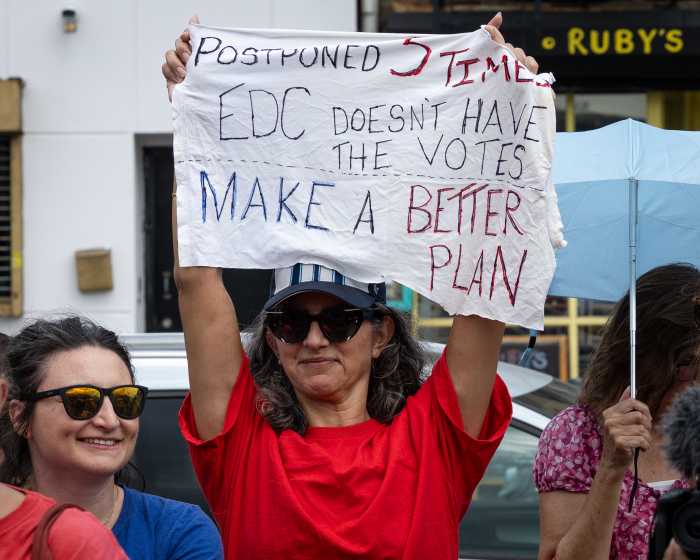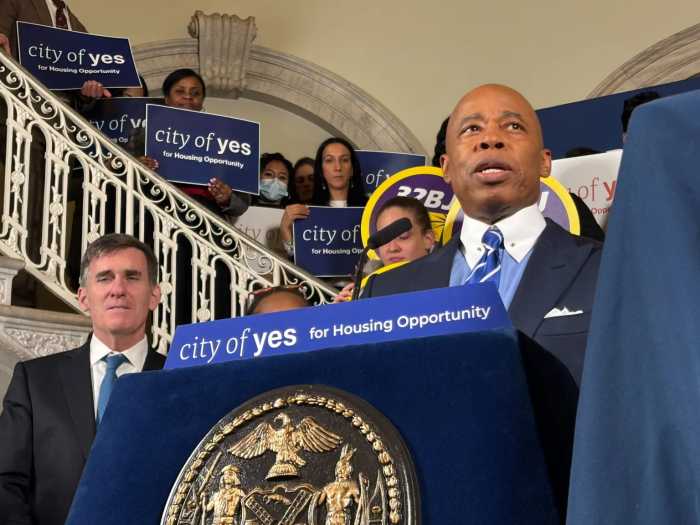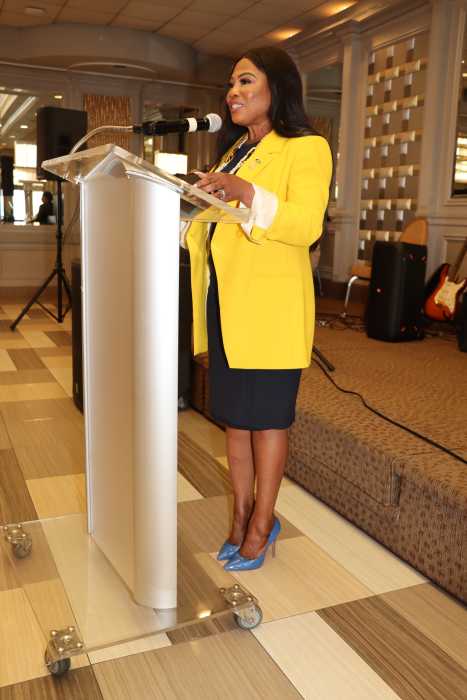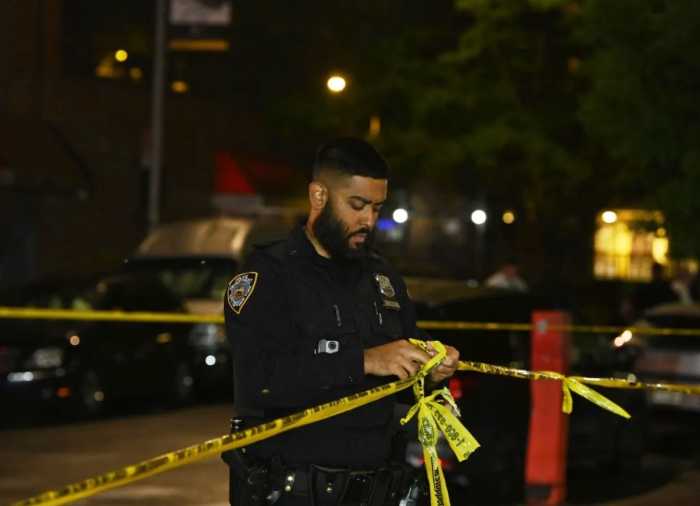BY PAUL SCHINDLER | “I think there will be an opportunity for us to form a progressive bloc and make some major changes on items that people have been looking to get done for years and never have been able to just because of the structure of the Council,” Lynn Schulman explained about her bid for the 29th City Council District seat in Queens in the September 15 Democratic primary.
“With one or two people, it’s very difficult for them to do, but if there’s a bloc that can push and put some leverage together, I think that that’s really important.”
Schulman explained that in putting together such a bloc should she win, her endorsements give her the beginnings of a foundation — she is supported by out lesbian District 2 Councilwoman Rosie Mendez from the Lower East Side, District 7 Councilman Robert Jackson, who represents Harlem, Washington Heights, and Inwood, District 21 Councilwoman Julissa Ferreras from Queens, and District 39 Councilwoman Sara Gonzáles from Brooklyn.
Lynn Schulman, with strong labor backing, takes on two former elected officials in Forest Hills
But in talking about challenging “the structure of the Council,” Schulman inevitably invites questions regarding her assessment of the leadership provided since early 2006 by Speaker Christine Quinn, who represents District 3, stretching from the West Village to Hell’s Kitchen. Both Quinn and Schulman are out lesbians.
“I think she has pushed a progressive agenda, but there have been some items on which there needs to be a balance with the mayor, and I think on some level there’s been some conservatism there, depending on the issue,” Schulman said of Quinn. “I think that there needs to be a balance but that everyone has a say, so I would hope that as a City Council member that I would have a say, and that we could go to the speaker and to the mayor and say, ‘These are issues of concern to us, and we want to work together on them and not just have somebody say that this is going to be the policy moving forward.’ And I’ve heard some complaints from some people on the Council that that is sometimes what happens.”
Schulman made her point, but was careful in choosing her words to do so.
Asked what issues she had in mind when referring to “items that people have been looking to get done for years,” she mentioned problems with the city’s Living Wage Law. The measure, passed in 2002, ensures a minimum wage level for employees of companies with certain types of service contracts with the city. At the time of its passage, the Brennan Center for Justice at the New York University School of Law hailed it as covering more workers than any such law in the nation — providing a living wage for up to 60,000 home healthcare and child care workers.
The problem, Schulman said, is inadequate provision for cost-of-living increases to keep pace with inflation and also lagging enforcement. Since the law went into effect, it has also been faulted for covering fewer workers than advocates originally intended. Large corporations receiving taxpayer-funded grants and tax abatements under city economic development programs were not covered.
It’s not surprising that Schulman focused on the living wage issue in addressing progressive future directions for the Council, since she is the recipient of two of the plums of labor endorsements in New York City — the Working Families Party and 1199 SEIU United Health Care Workers East, as well as the Communications Workers of America, the Freelancers Union, the Retail Workers and Department Store Union, and the Mason Tenders’ District Council of Greater New York, among others. She also has the support of out gay Chelsea State Senator Thomas K. Duane, who similarly enjoys strong labor support.
One endorsement that Schulman does not have is Quinn’s. The speaker endorsed Karen Koslowitz, who represented the district for ten years before term limits barred her from seeking reelection in 2001. The Council member since then, who beat Schulman in her first run for the seat, is Melinda Katz, who has chosen not to run again and is instead seeking the open city comptroller post.
Schulman speculated that Quinn might be eager to secure Koslowitz’s vote in next January’s speakership race should the former councilwoman re-gain her seat, while betting that Schulman would support her anyway. Quinn is also certainly mindful of the critical role the Queens County Democratic organization played in helping her first become speaker in 2006 — Koslowitz is the endorsed county candidate.
Schulman sat down with Gay City News just two days after City Hall newspaper ran a 10,000-word investigative piece probing the relationship between the Working Families Party, a for-profit political consulting affiliate, Data and Field Services (DFS), that it created, and seven candidates in the September primary — Schulman included. The City Hall story, and a series of follow-ups, suggested that in creating DFS, the Working Families Party was flouting the spirit, if not the letter, of city campaign finance law.
Schulman dismissed the issue, saying the contract her campaign has signed with DFS is “like any vendor relationship… In any campaign, people get hired to do petitioning, people get hired to do canvassing.”
Saying of the City Hall story, “Where the actual complaint stems from, I’m not clear on,” Schulman added, “I thought the article went in a round-about way to try to say something.” She argued that the candidates mentioned in the story are “folks who are trying to level the playing field, who are not part of the old politics, who don’t get their support from that network.”
Schulman added, “I know that my campaign is very above-board. The Campaign Finance Board has told my campaign that we’re very good in how we document everything.”
Schulman very much sees herself as challenging the “entrenched” powers that be in Queens. In addition to her county-endorsed rival Koslowitz, another of her opponents is also a former elected official — Michael L. Cohen, who served in the State Assembly until 2005.
“They were well known when they represented the district, but the district has changed considerably since they represented it,” Schulman said of competing with two Democrats who have already won election. She argued that with the steep rise in real estate prices in Manhattan and Brooklyn, until late 2007 at least, areas like the 29th District — which encompasses Forest Hills, Kew Gardens, Rego Park, and portions of Richmond Hills, Elmhurst, and Maspeth — have seen a huge influx of newcomers, many of them young professionals, both single and married with children, and a fair number of them LGBT.
“Lots of people 40 or below don’t know the two candidates who previously won election,” Schulman said.
Certainly, Schulman has held her own in raising campaign funds. Both she and Koslowitz have maxed out on the city public match of $84,122, and the most recent Campaign Finance Board figures show Schulman edges out the former city councilwoman $80,684 to $75,454 in private contributions. Cohen lags behind both women. A fourth candidate, Heidi Chain, has opted out of the public financing program, so Schulman, Koslowitz, and Cohen will all enjoy a bonus round of public matches.
Though she casts herself as an outsider bucking the status quo, Schulman is no stranger to public life in New York. A graduate of NYU and Brooklyn Law School, she first became politically active during the late Congresswoman Bella Abzug’s 1976 US Senate campaign, and three years later became district liaison for West Village Assemblyman William Passannante, the first legislative sponsor of New York State’s gay rights bill. She has also worked for former West Village City Councilwoman Carol Greitzer and Brooklyn Councilwoman Gonzáles, one of her endorsers.
In recent years, Schulman headed up the communications department at Gay Men’s Health Crisis and just prior to launching her campaign was a top executive at Woodhull Medical Center in Brooklyn.
Schulman said she has been surprised as she’s traveled the district at how often voters ask her about gay issues, the surest indication she’s found of the influx of LGBT community members into the area.
Still, she makes clear, as typically is the case with LGBT candidates, that she’s not the lesbian candidate, she’s the candidate who happens to be lesbian. The issues she talks about and the ones she hears about are the same — jobs, housing affordability, and education. There’s “a small minority” in the district, she said, who might not vote for her because she’s a lesbian, but such “anti-LGBT voters” are likely the same crowd who are “anti- a lot of the other progressive issues.”
“I think I have my finger on the pulse of the district,” Schulman said.


































